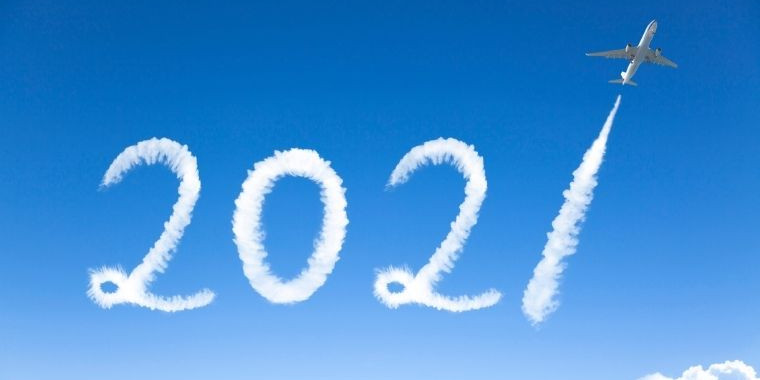Dec 15, 2020 Jan Uphues
ShareMerry Christmas and a happy new year 2021 everyone! Including me. We need a happy 2021, or let’s say, a lucky 2021 after this year. It leaves many of us somewhat exhausted and helpless after this huge amount of uncertainties, defeats, hoping and wishing. To put it plainly, for aviation, it’s been the most memorable year since World War II.
But lamentations are out of place now (in fact, they mostly are). If we compare our current situation with that of late summer, we might not think that things look particularly good. But if we look at the prospects compared to late summer, we can at least say: things are looking up. Even now, there are still many uncertainties, and these will accompany us throughout 2021. But there is more reason for optimism concerning the future than during the past nine months.
PANDEMIC ENDS WITH VACCINATION
Ever since the beginning of the pandemic, it has been the unanimous opinion of aviation experts, physicians, heads of organizations, virologists and politicians that the global situation will only change significantly once a vaccine is available and distributed worldwide. Investors on the global stock markets felt the same. The very first news of the first vaccine’s anticipated efficiency saw airline market prices skyrocket. Lufthansa alone gained around 20 percent on that single day. It’s a great sign of hope and also of the considerable work to be done for a fair distribution. IATA is already working with airlines, airports, global health bodies and pharmaceutical companies on a global airlift plan. According to them, the equivalent of 8,000 Boeing 747s will be needed for global distribution; In fact, the airlines will greatly contribute to the distribution. In that respect, they will play an important role for ending the pandemic.
Still, IATA doesn’t want to wait until everyone is vaccinated. Instead, the association has again appealed to national governments to make air travel easier with the help of more quick Corona virus tests. The association’s experts are working on a digital health passport that will be available for smartphones in the first half of 2021. It would enable passengers to easily prove their negative test results or vaccination against the Corona virus. IATA is not alone in developing such a product. Other examples include the CommonPass project and initiatives introduced on a national level by several governments.
This is certainly good news for airlines, but some of them want to go even further. Qantas is taking the radical step of only allowing passengers with proven vaccination protection on board. More airlines are expected to follow.
AVIATION 2021 COMEBACK ON VACCINE?
Today (this being written December 10th), a global vaccine distribution seems to be almost here. Millions upon millions of people can hardly wait to protect themselves from the disease through vaccination. Approvals are in the works at authorities, vaccination lines are being prepared and almost ready to start, and production and distribution are running at full speed. Can the aviation industry look forward to a real comeback in the coming year?
I think so provided that the worldwide vaccination campaigns are as successful as experts are predicting. Global RPKs are forecast to improve by 50% in 2021 following the steep decline in 2020. The industry is in dire need of these figures. During the many months in survival mode and the radical cost-cutting measures, enormous losses have been incurred. IATA estimates the net loss of the industry worldwide at an incredible 118.5 billion dollars for 2020 alone. Many companies had to take on billions in debt, which they now have to pay off over the years. The money is actually missing for new investments. Nevertheless, these must be made somehow because the general ramp-up will be complex and expensive.
HOW GOOD IS GOOD ENOUGH?
Does all this mean that everything will be okay with the help of vaccination? Certainly, things will get better, passengers will come back. According to Fritz Joussen, CEO of TUI, Europe's largest travel business, 2021 will be a year of transition. By 2022, tourism should have fully recovered. Already now, vacation bookings in Germany for the coming summer are three percent higher than figures for the summer 2020 (when there was no sign of the Corona virus).
That’s no surprise. After such a long break, people finally want to travel again, celebrate, get to know foreign countries and cultures. The problem is that a 12-month break is damn long. Additionally, resources have been saved or completely eliminated to such an extent that a sudden ramp-up to old size is simply not possible.
How well a ramp-up succeeds depends largely on the quality of the previous planning. But this is precisely the current problem of all airlines -- passengers have abandoned long-term vacation planning and are booking at increasingly shorter notice. Instead of booking their flights five or six months in advance, they sometimes book only five or six days ahead. From the passengers' point of view, this makes sense. The overall situation is more volatile and unpredictable than ever. No one can say exactly what travel restrictions will apply tomorrow, what flights will take place at all, and what precautions passengers will have to take (e.g., taking a negative COVD-19 test shortly before departure). In addition, some airlines have taken a long time to refund tickets for cancelled flights. All these factors undermine passenger confidence in a safe, predictable vacation.
EFFICIENT RESTART WITH PRECISE PLANNING
In order to enable a new start to be made safely and efficiently, several factors must be considered and interlinked: long-term planning, medium-term planning of staff and resources, and quick re-allocation of staff and tasks on the day of operation. A clear strategy from the governments to exit from this exceptional situation, as well as a fast and precise vaccination campaign, are also extremely important for the coming months. It won’t be sufficient to organize this at a national level. Multilateral arrangements and agreements between states and large regions are required. NGOs such as the WHO or, especially for aviation, IATA, play an equally important role. With cooperation, clever solutions, and combined forces, it will be possible to bring this crisis of the century to a tolerable end within a year. Here’s to 2021!
Will we have crowded airports in summer again? What will aviation 2021 look like? Share your thoughts with us!
About our Expert

Jan Uphues
Marketing Manager
From the exhilarating rush of his very first flight, Jan Uphues was captivated by the world of aviation. Though that maiden voyage had its jittery moments, it set the course for a lifelong passion. Starting at INFORM in 2018, he combined it with his second love: crafting compelling content.


